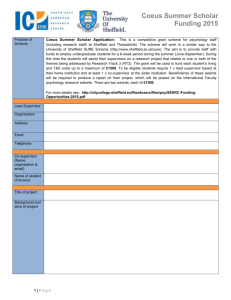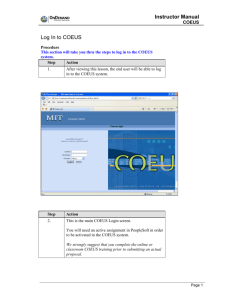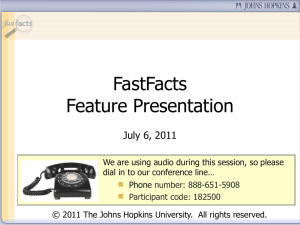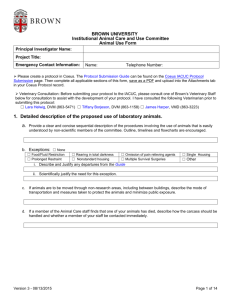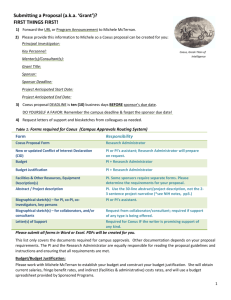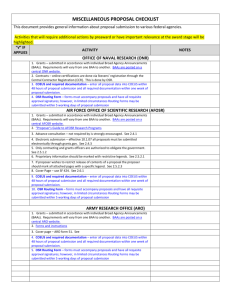September 2007 Newsletter
advertisement
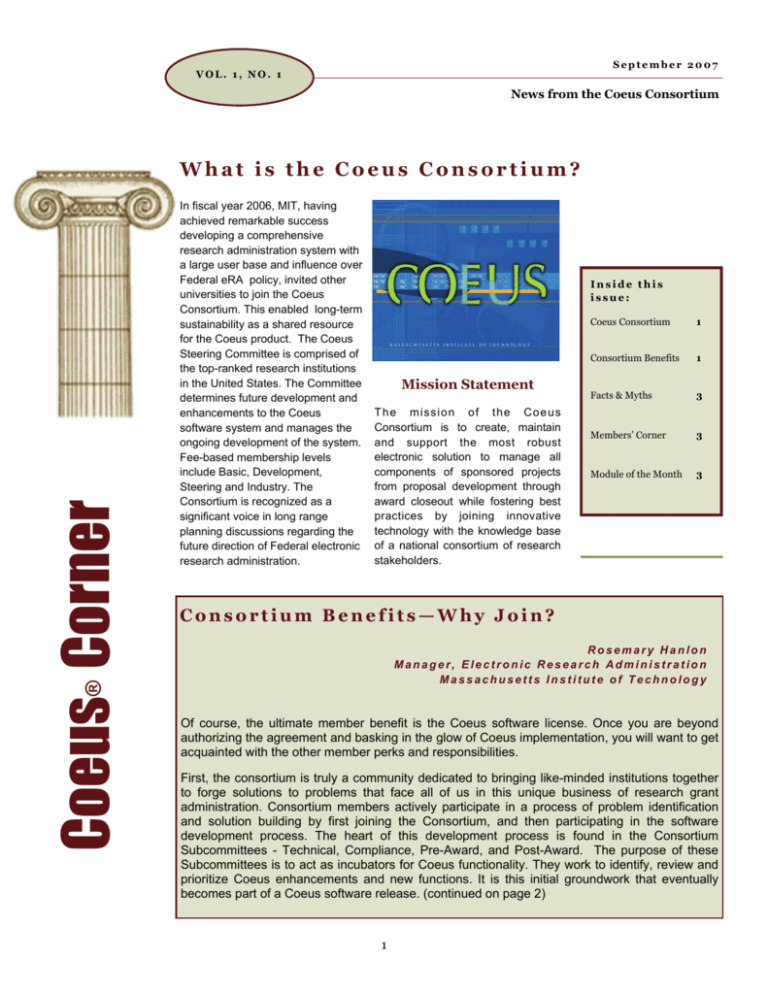
September 2007 VOL. 1, NO. 1 News from the Coeus Consortium In fiscal year 2006, MIT, having achieved remarkable success developing a comprehensive research administration system with a large user base and influence over Federal eRA policy, invited other universities to join the Coeus Consortium. This enabled long-term sustainability as a shared resource for the Coeus product. The Coeus Steering Committee is comprised of the top-ranked research institutions in the United States. The Committee determines future development and enhancements to the Coeus software system and manages the ongoing development of the system. Fee-based membership levels include Basic, Development, Steering and Industry. The Consortium is recognized as a significant voice in long range planning discussions regarding the future direction of Federal electronic research administration. Inside this issue: Mission Statement T he mission of the Coe us Consortium is to create, maintain and support the most robust electronic solution to manage all components of sponsored projects from proposal development through award closeout while fostering best practices by joining innovative technology with the knowledge base of a national consortium of research stakeholders. Coeus Consortium 1 Consortium Benefits 1 Facts & Myths 3 Members’ Corner 3 Module of the Month 3 Consortium Benefits—Why Join? Rosemary Hanlon Manager, Electronic Research Administration Massachusetts Institute of Technology ® Coeus Corner What is the Coeus Consortium? Of course, the ultimate member benefit is the Coeus software license. Once you are beyond authorizing the agreement and basking in the glow of Coeus implementation, you will want to get acquainted with the other member perks and responsibilities. First, the consortium is truly a community dedicated to bringing like-minded institutions together to forge solutions to problems that face all of us in this unique business of research grant administration. Consortium members actively participate in a process of problem identification and solution building by first joining the Consortium, and then participating in the software development process. The heart of this development process is found in the Consortium Subcommittees - Technical, Compliance, Pre-Award, and Post-Award. The purpose of these Subcommittees is to act as incubators for Coeus functionality. They work to identify, review and prioritize Coeus enhancements and new functions. It is this initial groundwork that eventually becomes part of a Coeus software release. (continued on page 2) 1 C o n s o r t i u m B e n e f i t s ( continued Welcome to our New Members! ● Drexel University ● Research Foundation SUNY Coeus Consortium (Buffalo, Stony Brook, Albany, Binghamton) ● Loyola Marymount University ● Kent State University ● University of California— Merced ● The Jackson Laboratory ● Maine Medical Center Research Institute from page 1) All Consortium members can participate in these Subcommittees. In order for Coeus to be the best it can be, we need all members to provide ideas, feedback and a willingness to champion these ideas from concept, through development, testing, documentation, and ultimately implementation. Only Steering and Development level members can vote at the subcommittee level to create the prioritization list to present to the Steering Committee. It is the Steering-level membership that has the right for final voting across all Subcommittee rank lists on what projects will be included in the next software release, but all consortium members benefit from the results of these efforts. To be able to participate in the subcommittees, you’ll need to join mailing lists created for each group—Compliance, Pre-Award, Post-Award and Technical. The following committees are reserved for Steering-level members: Coeus Steering Committee Coeus Membership and Operations A benefit exclusively for Steering-level members is the ability to use a portion of their annual membership fee for a member-specified customization project, also known as an Infrastructure Project. The institutions that have joined at Steering level have done so in order to help guide Coeus for the betterment of all users, but also because they have institutional requirements that need fulfillment. Sometimes, these requirements are recognized as universal by all members, and prioritized for implementation. CoeusLite is an example of universal agreement of the Steering Committee. This enhancement item shot to the top of the development prioritization list and the Committee voted unanimously for ASAP implementation. But there have been, and will always be, small projects that are too specific to one member’s business practice to be given a priority ranking by a Subcommittee, thus never making it to the rank list for full Steering Committee voting. The Steering member can request to use their reserve funds to fund a member-specified project. The Steering Committee is nearing finalization of the documented guidelines and procedures for using member reserve funds. How Do I Join? If you are interested in licensing Coeus, please contact coeus-help@mit.edu. If you are interested in joining the Coeus Consortium, please email Rosemary Hanlon at rhanlon@mit.edu. Another benefit to all members is access to the Coeus.org website. While this website contains Coeus information for the general public, there are password-protected sections for Consortium members. These passwordprotected sections contain a wealth of resources being developed and shared among members, including documentation, technical guides, and Consortium business practice documents as well as the Coeus Wiki. These web pages (like Coeus) are updated regularly, and member input in the wiki, web pages and this newsletter-- are actively encouraged! Once your institution has finalized your membership, register for access to the Coeus.org website – our online community home. Please provide the names and email addresses of individuals who will need to have access to the member-only web page and wiki by sending email to: coeus-help@mit.edu. A username and password will be established and activation should take place in one business day. 2 Coeus—Facts & Myths Is Coeus a financial system that tracks budget expenditures? No, the Coeus program is a proposal and award management tool. It is not a financial system. Sponsored Program administrators and investigators can use Coeus to prepare proposals, route them to obtain proper approvals, and submit them to sponsors. Coeus maintains very detailed information on awards. The system maintains a complete history of every change made to a record. So, for example, when you look at the "Money and End Date" screen, you are able to "walk" through the complete history of the award. You can see the notice of award and every modification made to the award. In addition, the Coeus program maintains all agency contacts (in the electronic Rolodex), all reports (financial, technical, property, patents), all terms and conditions of the award, and all required approvals for the award. Coeus also has Conflict of Interest and IRB modules that manage COI and human subject protocols respectively. COI and IRB module records can be linked with proposals and awards. Module of the Month—Awards Do departments request information from you concerning every award the department is listed on, including awards where they aren’t the lead PI? The search function in the Awards module allows users to locate all awards for PI John Doe. Go to the Investigator column and type in Doe* and click the Find button. It will return all awards for PI Doe in your Coeus system. The records returned contain the sponsor award number, the lead unit name and number, the title of the proposal, amount of the award, effective date, expiration date, the OSP administrator, etc. This can be saved as an Excel file which can then be modified as needed and presented to the department. Members’ Corner University of Maryland— Baltimore Sharon Bowser Assistant Dean for Information Services University of Maryland School of Medicine University of Maryland, Baltimore’s Coeus Environments The University of Maryland, Baltimore went live with Coeus in February 2007. Inclusive of the July submission cycle, 19 proposals from four departments in two schools have been submitted using the Coeus premium version 4.2. We started slowly, putting emphasis on communications and support. Classroom and simulated training venues have been developed; monthly “What is Coeus” seminars are being held. The Coeus website is being developed and numerous FAQs have been written. We have established support models in the office of research and development and in the schools. Current business processes are being evaluated, and, in some cases, changed, to take advantage of Coeus functionality. Our efforts would not have been successful without the appropriate Coeus environments in which our multi-partnered Coeus project team can work. UMB is utilizing the following environments: COEUS Sandbox The Sandbox environment is where UMB installs new MIT releases and applies the 12-step installation instructions. No UMB modifications happen in this environment. COEUS Development The Development environment is where preliminary testing is conducted to ensure that Coeus works correctly with both MIT updates and UMB customizations. The Development environment is connected to the test version of our LDAP as well as to Grants.gov, eRA Commons, and FastLane test portals. Upon successful completion of preliminary testing we move to the test environment. COEUS Test Coeus Test is where comprehensive application testing is performed. It is connected to the test version of our LDAP as well as to Grants.gov, eRA Commons, and FastLane test portals. An account with the password “coeus” exists for all UMB employees. This allows the project team to log on as any Coeus user to conduct thorough tests. (continued on page 4) 3 Looking Ahead — Coeus 4.3 Features and Enhancements ● Proposal Hierarchy routing enhancements ● Concurrent proposal development in CoeusLite ● Ability to upload award documents Members’ Corner—UMB (continued from page 3) Maps and business rules are created; roles and rights are assigned, and the complete proposal creation, routing, approval/rejection, and submission cycle is tested here. We create and submit numerous proposals to Grants.gov’s test environment. When testing has been validated, we move to the Coeus production environment. COEUS Production ● Additional Grants.gov enhancements and validations The Coeus production environment contains all proposals in process and those that have been submitted. No testing is conducted here. If problems are encountered in production, analysis is conducted in the post-production environment. ● Email notifications COEUS Post-Production ● Interface for setting up customer roles The Coeus post-production environment is a copy of production. This is where any problems encountered in production are tested. Any issue that can be replicated in post-production is retested in sandbox to see if the problem exists in the MIT delivered environment. It is also tested in our development environment, to ascertain if the problem was introduced as a result of a UMB modification. ● IRB protocol development for department users ● Tracking of Effort ● Enhancements to Notice of Award ● Sync narrative types to Grants.gov forms UMB Coeus website – http://www.umaryland.edu/coeus FAQ - http://www.umaryland.edu/coeus/faq.html ● Many enhancements to CoeusLite for Proposal Development and IRB Editor: Vonnie Perkins Design & Layout: Sally Egloff, Vonnie Perkins Contributors: Sharon Bow ser, Steve Dowdy, Tom Drinane, Rosemary Hanlon, Vonnie Perkins, Rob Yetter The electronic version of this newsletter can be found at http://www.coeus.org . Coeus Consortium Massachusetts Institute of Technology Steve Dowdy, Program Director Office of Sponsored Programs, E19-750 Cambridge, MA 02139 Phone: 617.253.6925 Email: coeus-help@mit.edu http:www.coeus.org If you would like to contribute an article or have suggestions for topics you would like to see in Coeus Corner, please contact us at coeus-help@umd.edu . 4
